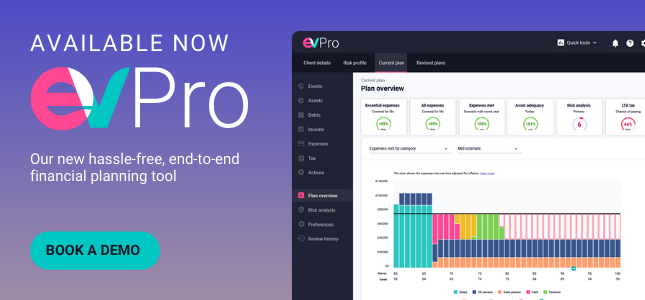Considering your clients' changing preferences for ESG investing

Demand from consumers for Environmental, Social, Governance (ESG) or Socially Responsible Investing (SRI) products have dramatically increased and become an important part of many adviser’s financial planning conversations. The trend is set to continue as we see the impact of COVID-19 and how we live our lives in the future.
Since the beginning of the pandemic, consumers are making more sustainable choices in their daily lives, changing simple things such as shopping locally to reduce their carbon footprint, recycling household waste, living more sustainably to reduce waste, and choosing greener ways to travel (when permitted).
Naturally, this is beginning to influence decisions around finances, in particular, ESG investing.
New ways of thinking about investing
As the world wakes up to new ESG investing opportunities, advisers and the broader financial planning community will need to find ways to adapt their processes to meet their clients’ changing needs.
Even before the COVID-19 pandemic, the environmentally friendly wheels were very much turning. One group, in particular, influencing the trend for more sustainable investing is millennials, who will have a significant role to play in shaping the adviser industry in the future.
A 2019 Morgan Stanley Institute for Sustainable Investing survey of investors found that 95% of millennials were interested in sustainable investing. Still, numerous studies show that other generational groups are also showing an interest, so it’s crucial to consider the evolving ESG client demands and adapt your advice process to accommodate both a regulatory and consumer demand standpoint.
What does the term ESG stand for?
The term ESG is used alongside sustainable investing and socially responsible investing (SRI) and defining ESG factors as a consideration alongside performance factors when choosing investments. ESG stands for Environmental, Social and Governance.
ESG is a non-performance indicator showing that your investments positively impact society, the environment, and the business’s performance.
These indicators help understand how sustainable a company is and its impact on everyone involved, including customers, employees, and broader society.
- Environmental factors determine a company's care of the environment and focus, for example, on waste pollution, deforestation and climate change.
- Social factors look at how a company treats people and focuses, for example, on employee diversity, working conditions and conflict.
- Governance factors take a look at corporate policies and how a company ran. They focus, for example, on tax strategy, donations, and board diversity and structure.
Why do financial advisers need to consider ESG?
Firstly, there is regulatory pressure. MiFID II and Insurance Distribution Directive included amendments to ensure that advisers take into account clients’ sustainability preferences in their suitability assessment:
“To enable investment firms that provide investment advice and portfolio management to recommend suitable products to their clients, those investment firms should introduce in their suitability assessment questions that help identify the client’s individual ESG preferences.“
Secondly, demand is coming directly from consumers themselves. A staggering 94% of consumers who took part in an EV survey in March 2021 thought that at least one of the ESG factors were quite essential or very important - with only the remaining 6% thinking it wasn’t necessary to them at all.
Benefits of an ESG questionnaire in your suitability advice process?
When selecting the relevant investment strategy for your client, it is important to understand their ESG preferences, so by including a range of questions you can provide a base for the discussion to better understand their sustainable investment style. But there are many other benefits to including ESG questions in your fact-find, including;
- Supporting your suitability process by complimenting the risk profiling process
- Fulfilling the existing requirement to know your customer by extending beyond just financial situation and objectives
- Provide a compliance audit trail by documenting the importance of sustainable investments
- Helping you guide the discussion by providing a starting point for the conversation with the client.
- Add value to your advice service that clients will really appreciate
- Building a speciality in ESG will likely lead to a competitive advantage in the coming years
Conclusion
More consumer interest and a better understanding of ESG investing are creating a perfect opportunity for you to attract and retain clients across a diverse range of demographics. By adding ESG to the discussion you create a deeper conversation with your clients.
Instead of solely being performance-focused, you have the chance to move the conversation to some of the following;
- What impact clients want to have with their investments?
- How their investments are impacting the world around them;
- The positive change on others or the environmental impact their investments can provide to climate change, for example.
These more profound, more meaningful conversations can lead to more robust, longer-lasting client engagement and relationships. Choosing to build a speciality in ESG will likely lead to a competitive advantage in the coming years.
So what next?
If you found this information helpful and want to see how you can deliver better financial outcomes for your clients that are aligned to their ESG preferences. Then, why not book your one-to-one demo of EVPro, ahead of launch by clicking the link below.
